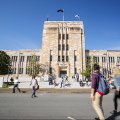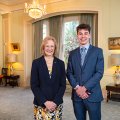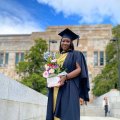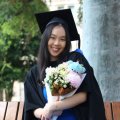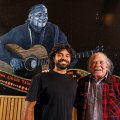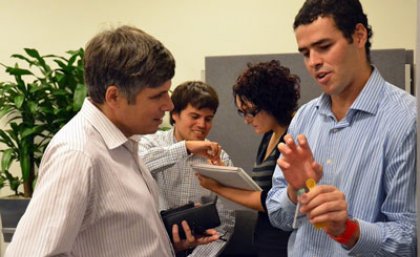
A trip to Brisbane has given a group of ambitious Chilean engineering students a new understanding of the role that research and commercialisation will play in their future careers.
As part of an eight-week customised Research Skills Training Program at The University of Queensland, 14 high-performing Chilean undergraduates in their final year of engineering studies have learned English speaking skills, research skills and an understanding of how to apply their research to industry.
Not only did the students spend time at the university’s Faculty of Engineering, Architecture and Information Technology (EAIT), but they also took on vital lessons from the UQ Graduate School, UQ Business School and research commercialisation entity UniQuest.
Students say they were impressed by the focus on commercialisation, which gave them a different perspective to the more academic focus back home in Chile.
“Where I come from, normally the focus has been more on academic purposes so it has been amazing to see here in UQ how there is a program that when you do research then you will always apply it to industry,” said student Ignacio Urzua.
Phillip Fredericks of the UQ’s Institute of Continuing and TESOL Education (ICTE-UQ) said the students were discovering how research could play a major part in their future academic and professional careers.
“The students were partnered with UQ research mentors for eight weeks from February–March 2012 to learn more about a range of UQ engineering research projects first hand and to undertake a mini-research project of their own,” said Mr Fredericks.
“They were also able to tour the inner workings of four of the university’s world-class research facilities and attend a series of workshops on how UQ has successfully commercialised its research activities to deliver real benefits to industry and communities around the world,” he said.
“By giving the students insights into research at UQ, it is hoped they will be inspired to undertake research higher degree studies in an English-speaking country.”
Before they returned home, the students had a taste-test of sharing research findings on an international stage when they presented their mini-research projects to their peers at an end-of-program presentation and poster session.
The students were also equipped with core academic and language skills through a series of intensive English for Academic and Research Communications classes and practical research skills workshops.
The program was made possible thanks to funding from the Comisión Nacional de Investigación Científica y Tecnológica (CONICYT), Ministry of Education, Chile.
UQ and CONICYT signed a Memorandum of Understanding in 2007 to facilitate collaboration in the areas of research and innovation cooperation, including human resources capacity development.
A short clip of the 2012 program participants talking about their experience is available online here.
Media: Phillip Fredericks (07 3346 6706 or p.fredericks@icte.uq.edu.au) or Carla Gonzalez Zlatar (c.gonzalez@icte.uq.edu.au)

